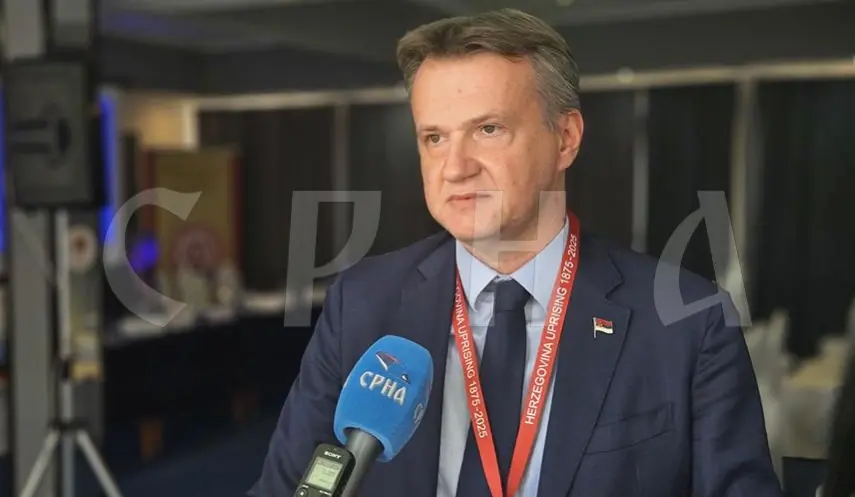MITIĆ: NEVESINJE UPRISING - SYMBOL OF SERBIAN INFLUENCE ON GLOBAL GEOPOLITICS
Republika Srpska - Trebinje - conference
06/11/2025
12:52

TREBINJE, JUNE 11 /SRNA/ – The Nevesinje Uprising symbolizes Serbian influence on the global geopolitical stage and is an integral part of the strategic narrative of the Serbian people from Serbia and Republika Srpska because it represents a struggle against discrimination, a fight for liberation, and political independence, said Aleksandar Mitić, a research associate at the Institute of International Politics and Economics in Belgrade.
According to him, the event is significant because what began in Herzegovina at that time spread throughout the Balkans and had a major geopolitical impact.
"If we compare this to current geopolitical changes in the world, the events of the 1990s had a major geopolitical influence and led to a transformation from a unipolar order to an ongoing process of multipolarization," Mitić emphasized.
Political analyst Biljana Vankovska said today in Trebinje that the concept of multipolarity is forgotten in North Macedonia, as political elites there still claim that the sun rises only in the West.
"They are so loyal to that idea that they say all good comes from the West. But now there is the 'Trump' factor, and the political divorce from the West in my country has led to a kind of confusion, as now there are two suns in the West," said Vankovska during the conference "150 Years Since the Herzegovina Uprising: Impact on Regional Security and European Geopolitics."
Political analyst John Laughland emphasized that the Berlin Congress is important from the perspective of modern globalization because one of its innovations was the concept of humanitarian intervention, which aligns with today’s globalist agenda.
He added that the Berlin Congress placed BiH under Austro-Hungarian administration while formally leaving it within the Ottoman Empire.
"I believe it’s clear there’s a parallel between Oskar Potiorek and Christian Schmidt," Laughland noted.
Ladislav Zemanek from the Czech Republic said that today’s world is marked by a struggle for influence, just as it was during the time of the Herzegovina Uprising, explaining that the uprising weakened the influence of the Ottoman Empire.
"And today, Ukraine is the space where Russia is trying to reclaim its historical territories, while the West supports the Ukrainian war machine to prevent defeat," Zemanek stressed, adding that the question of peace is really a question of interests, not ideals.
According to him, large peace summits now focus more on balancing the interests of great powers involved in the conflict than on justice, with smaller countries suffering the most in the process.
The two-day International Conference “150 Years Since the Herzegovina Uprising: Impact on Regional Security and European Geopolitics” continued today in Trebinje. The conference features historians, political scientists, academics, and distinguished experts from Republika Srpska, Serbia, Russia, and France discussing the socio-political circumstances leading up to the uprising and its national and historical significance.
The conference is organized by the Institute of Historical Sciences of the University of East Sarajevo and the Institute of International Politics and Economics in Belgrade, with the support of the Ministry of Science, Innovation and Technological Development of Serbia and the Ministry of Scientific and Technological Development and Higher Education of Republika Srpska.

SERBS IN TEARS AND FEAR OVER OWNERSHIP OF ORTHODOX CEMETERIES AND CHURCHES

CVIJANOVIĆ DEMANDS ACCOUNTABILITY FOR SHAMEFUL CONCERT IN ŠIROKI BRIJEG

OSTOJIĆ URGES BiH AND EU TO ACT OVER GLORIFICATION OF FASCIST IDEOLOGIES





